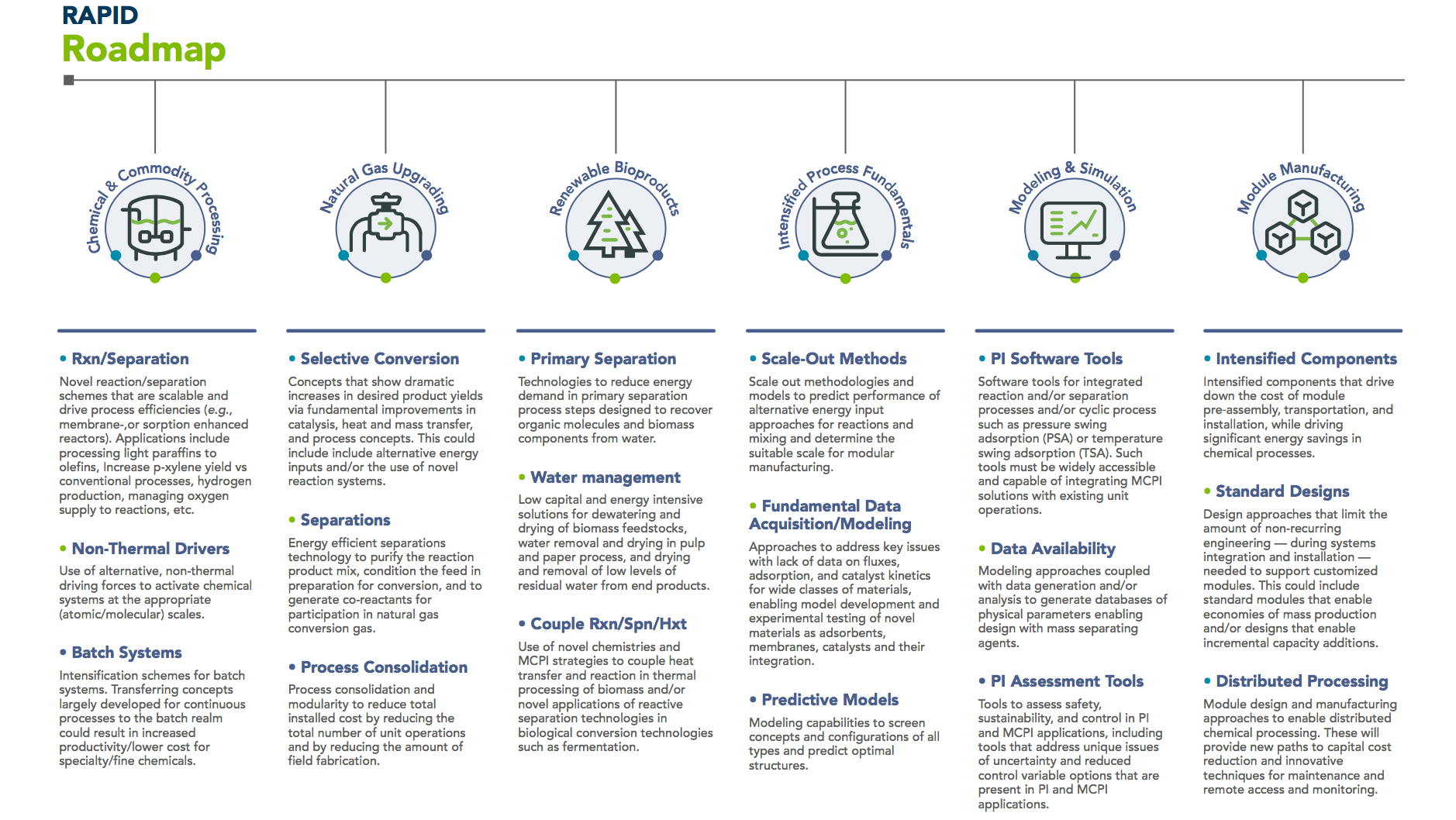About RAPID: Institute Roadmap

When it comes to improving energy efficiency and lowering investment requirements in the process industries, modular chemical process intensification (MCPI) has been a long-standing concept. In general, though, MCPI deployment in energy-intensive industries has been limited by several barriers, including:
- Capital costs and RAM (reliability/availability/maintenance) risk involved in committing to new processes
- High complexity of an intensified, modular system, without simplifying standardization techniques
- Insuffcient software and design tools and data to develop intensified processes
- Challenge (technical, economic, and re: intellectual property) of developing standardized design and manufacturing protocols for a complex new technology space at an early point in its technical and commercial development
- Limited understanding of design and operation of MCPI technologies across a broad range of key industry participants
In December, 2016, the Department of Energy announced the establishment of the 10th Manufacturing USA Institute, representing a critical step in the federal government’s effort to double U.S. energy productivity by 2030. The Rapid Advancement in Process Intensification Deployment (RAPID) Institute is focused on addressing the barriers listed above to enable the development of breakthrough technologies to boost energy productivity and energy efficiency through manufacturing processes in industries such oil and gas, pulp and paper and various domestic chemical manufacturers. RAPID will leverage approaches to modular chemical process intensification (MCPI) — such as combining multiple process steps such as mixing, reaction, and separation into single more complex and intensified processes — with the goal of improving productivity and efficiency, cutting operating costs, and reducing waste.
What is Modular Chemical Process Intensification?
While the concepts of process intensification and modular process designs are not new, there is still a significant lack of clarity on what these terms do (and do not) include. The roots of process intensification extend back at least to the 1970s, when process developers began to seek dramatically different configurations and design principles to make transformative changes in cost/performance parameters. Advances in process optimization were able to deliver sizable improvements in some cases, with more sophisticated integration of heating and coolant flows via process analysis as one example. Other areas include development of very active and selective catalysts and advanced process control methods. Such advances clearly fit within the broad definition of PI, even though they are classical methods of process improvement. Current process intensification builds on, and moves beyond, the concepts in novel process design and reaction engineering listed above and takes advantage of additional drivers:
- Advances in hardware and control strategies to combine multiple process steps into a single unit (e.g., membrane reactors for reactive separation to deal with chemical equilibrium constraints and divided wall columns to replace multiple individual units). Such processes have the potential to reduce capital costs through a reduction in distinct process steps and also the potential to improve energy effciency by reducing recycle streams and improving on heat/mass transfer inefficiencies created by the use of stand-alone process steps.
- Application of significantly enhanced driving forces — both chemical and physical — to drive chemical and transport processes. This would include the use of rotation to enhance buoyancy driven processes and the use of non-traditional energy sources to drive heat, mass, and momentum transport (e.g., ultrasonic mixing, microwave heating, etc.).
RAPID Focus Area Overview
RAPID has highlighted six focus areas to organize the scope of research and development activities in the institute. These include 3 application areas that were selected based on the high level of energy/capital intensity or their potential to benefit from widely distributed modular technologies — Chemical and Commodity Processing, Natural Gas Upgrading, and Renewable Bioproducts.
- Chemical & Commodity Processing
- Natural Gas Upgrading
- Renewable Bioproducts
Three additional areas were selected that focus on the underpinning science and technology that will be required for broader utilization of MCPI technologies — Modeling and Simulation, Intensified Process Fundamentals, and Module Manufacturing.
- Modeling and Simulation
- Intensified Process Fundamentals
- Module Manufacturing
Roadmapping Process
You can learn more about the roadmapping process for the RAPID Manufacturing Institute by downloading the PDF below.

